By: Maya Mann
To discover the history of the establishment of the African American Studies Department, research was conducted. In the first stages of research it was found that Trenton State College, the old name of The College of New Jersey, had established a Black Studies program around 1970 that was later developed into the current African American Studies Department. It was found that so-called ‘race riots’ happening at Trenton State, that eventually pressured the college into forming a program, were due to the college unwilling to accommodate the demands of Black and Latino students and sympathetic faculty and staff. Through the helping hands of Dr. Williams, Mr. Chambers, as well as Ms. Schiff, the attainment of primary sources and oral history was possible. Through these sources, the historical events that shaped the department are more evident, and the search for the true story was underway.
Dr. Piper Williams is an Associate professor of English and African American Studies. Starting in 2002, she had a lot of experience within the department and was able to clarify many of the crucial aspects about the establishment of Black Studies at Trenton State. When asked of her role during her time at the newly form African American Studies department and how she helped to advance it’s develop:
“I always advise the minors, so I thought it was really important. I thought, you know, on the campus no one advises minors, but since we didn’t have a major until 2016, and I started so much earlier than that, so I always advise the minors. I took care of assessments, I actually had to create the courses that I routinely teach…”
Dr. Williams went on to say that Dr. Gloria Dickinson, who was a member of the English department and a key founder of the African American Studies Department, was really interested in history, spirituality, and religion. In response to this, Dr. Williams created African American literature courses that were cross-listed between English and African American studies. She also helped create capstones for the English department and then eventually for the African studies major, which also helped the department’s establishment.
When asked about her thought on Black Studies as an interdisciplinary field and why is it so important for its inclusion at colleges:
“Well, colleges need Black Studies, because Black Studies are American studies and if you don’t understand the Black American experience, and you really only have half the history… Well, America had enslaved people from Africa before it was a nation. Since it’s been a nation, it has had many immigrants from Europe. And rest for all over the world, but white supremacy made it so that there was really a binary between people who are white and people who are not white…”
And when asked about the specific knowledge, she had about the events and history of the process of the establishment of the AAS department at TCNJ:
“You know the late 1960s, in the early 1970s, is the moment that the Black power movement as a political thing is happening, but also a moment when the Black arts are happening, so I just know that that time period is the country… moved past after King, you know, cause he’s murdered in the mid 60s. The riots, the radicalization, sort of Black activism. And I think that spreads across a lot of campuses. With all the ways that TCNJ has ignored us, challenged us, under resourced us, and is visibly regressive, it is kind of amazing that we got a department. You know 50 years ago I really, I really don’t even totally understand how that happened”
Dr. Williams then states how she believes the Students were probably more empowered because of what was going on with national Black activism. From this, the students started to demand recognition and the students and the faculty are all collaborated together.
“Well, I think, I think there are other things going on with like the President and other people, so I think there’s some drama at the College, but I really don’t know how it happened because it’s pretty amazing that they got the department so early” stated Dr. Williams, ending her response for this question.
From what Dr. Williams could tell, due to the Black Power Movement going on at the time and the rise of Black activism, students as well as faculty at Trenton State started to work together and demand a Black studies department. She was unaware of the specifics of the ‘riots’ that pressured the college, as well as some specific procedures that were followed to gain Black Studies. For courses that were needed to officially establish the department, Dr. Williams undertook that task herself by creating several courses for the minor and eventually major.
Mr. James Chambers was a former student of Trenton State that attended during the time of the Black Studies establishment. He had a lot of knowledge and information of the events that led to the establishment, which he shared orally and through a series of documents.
When asked to confirm if ‘race riots’ led to the establishment of the department, and if this was true to possible add more details:
“Yes, partially, after all, then that’s how most of us, ‘69 and ‘70, arrived on campus and across all campuses predominantly white institutions anyway throughout America. But for the College, It was, in addition to the racial turmoil, there was just this need and desire for us to have something of our own, first of all to learn critical race theory we didn’t call it that, that that time, but to learn about… The department grew out of this need that students of color, Black students and some Latinos had for. Having a place of our, own a place, we could call home, a place where we could study and learn our history.”
The historical documents Mr. Chambers’ lent also reinforce the past sentiments. Mr. Chambers, along with other students, created a list of demands that they wanted the college to abide by, and this was a significant factor in the establishment of the African American Studies Department. Along with requesting a Black room for comfort, the demands also listed having a Black studies program, which was soon established after these demands were received.

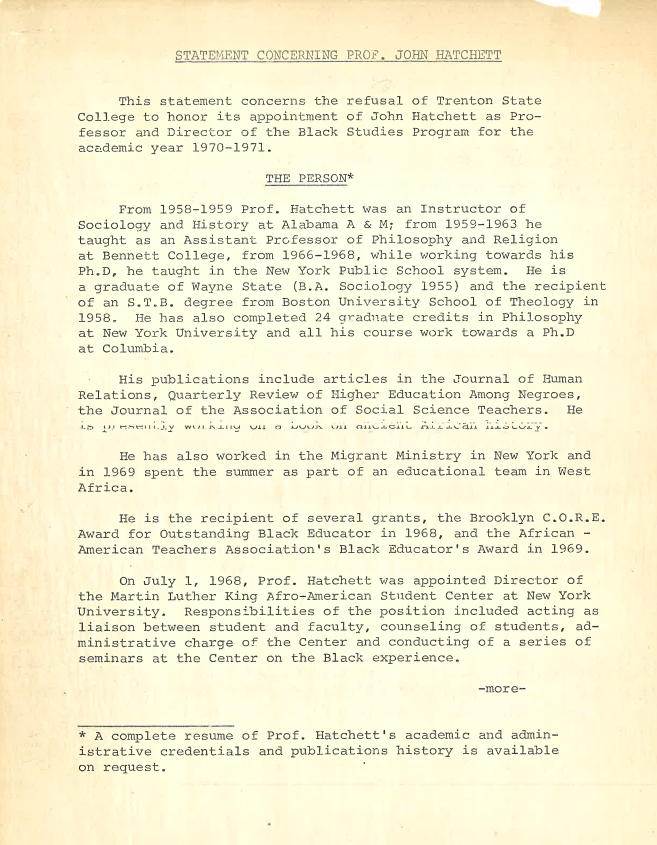
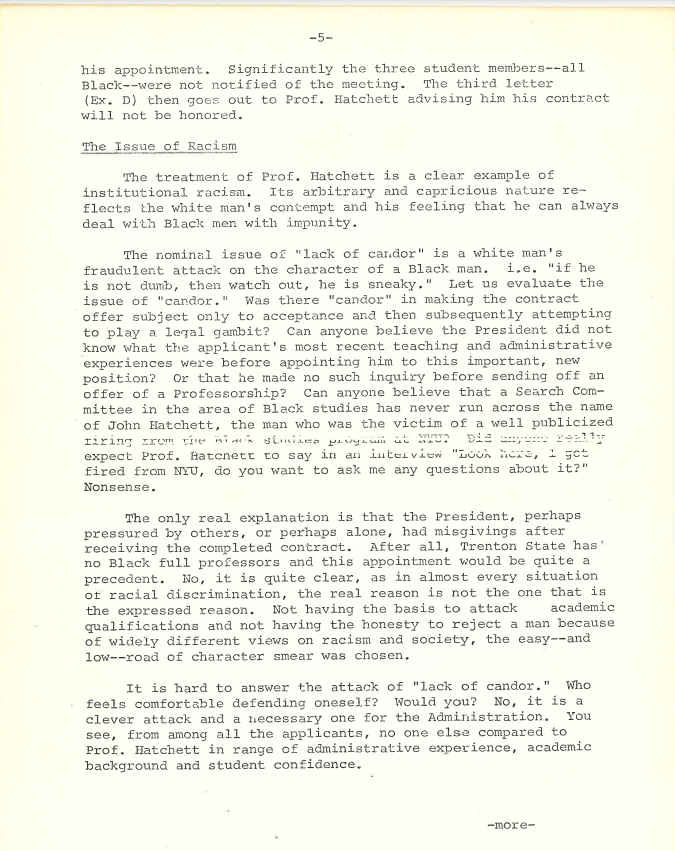
Though there was still trouble after the establishment of the African American Studies Department was underway. Professor John Hatchett, a dismissed professor from NYU, was refused as the director of the African-American Studies department at TCNJ for the 1970-1971 school year. This came after accusations of anti-Semitism against Hatchett. Many people, including students and faculty, claimed this to be false and anger rose.
Through the documents provided by Mr. Chambers, the denial of Professor Hatchett’s position as director of the department based on the issue of institutional racism. It can be seen that this situation delayed the complete establishment of the department, which makes it worthy of note.
Ms. Debra Schiff, a professional archivist as well as the TCNJ Archives Librarian, provided documents that are essentially faculty minutes. Within these minutes, we see that there was a desire to put more emphasis on the formation of the Black Studies program, and a committee was formed to complete this task. Along with this, the need for a director of the Black Studies program is suggested, and Professor Hatchett is first mentioned and is the number one candidate. Then the anti-Semitic accusations are discussed. In the next meeting, the committee, that was made to put more emphasis on the Black Studies, proposed a minor program. Then the same committee supports Professor Hatchett as director, yet other faculty members, that are unrelated to Black Studies, do not support. The meeting ends with Professor Hatchett being refused the position.
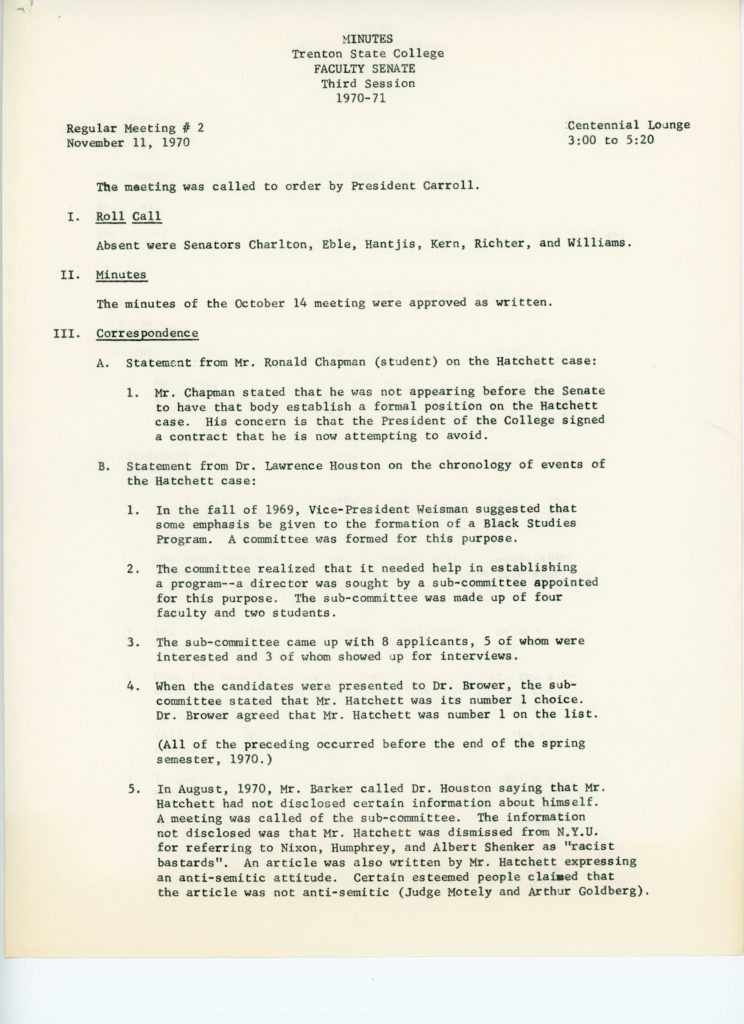
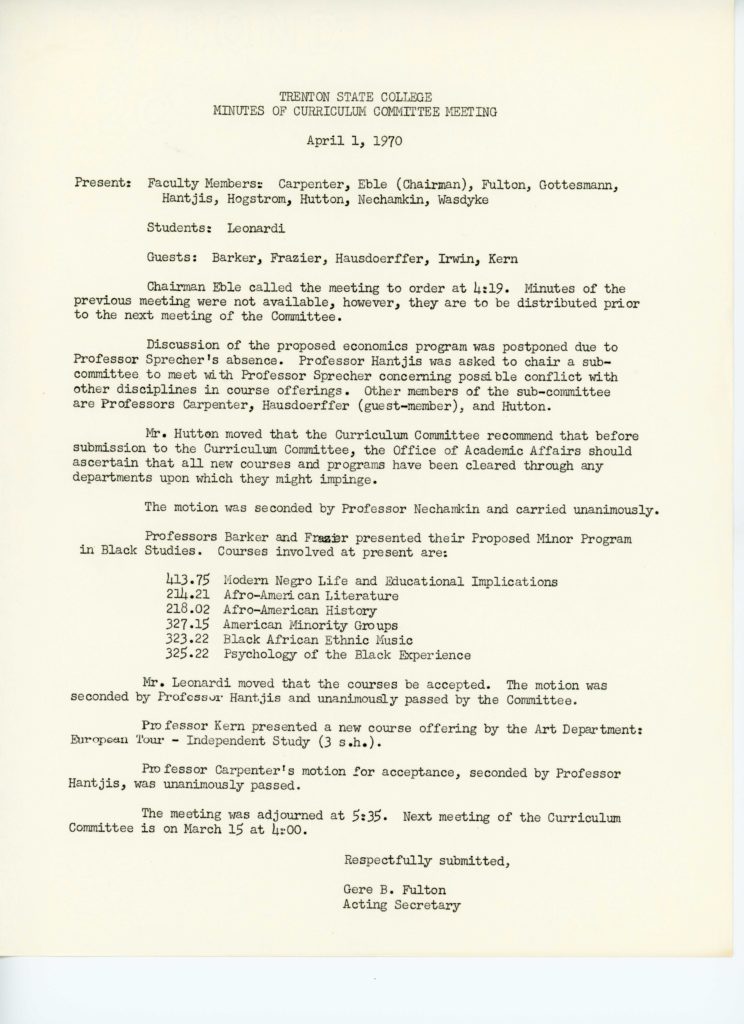
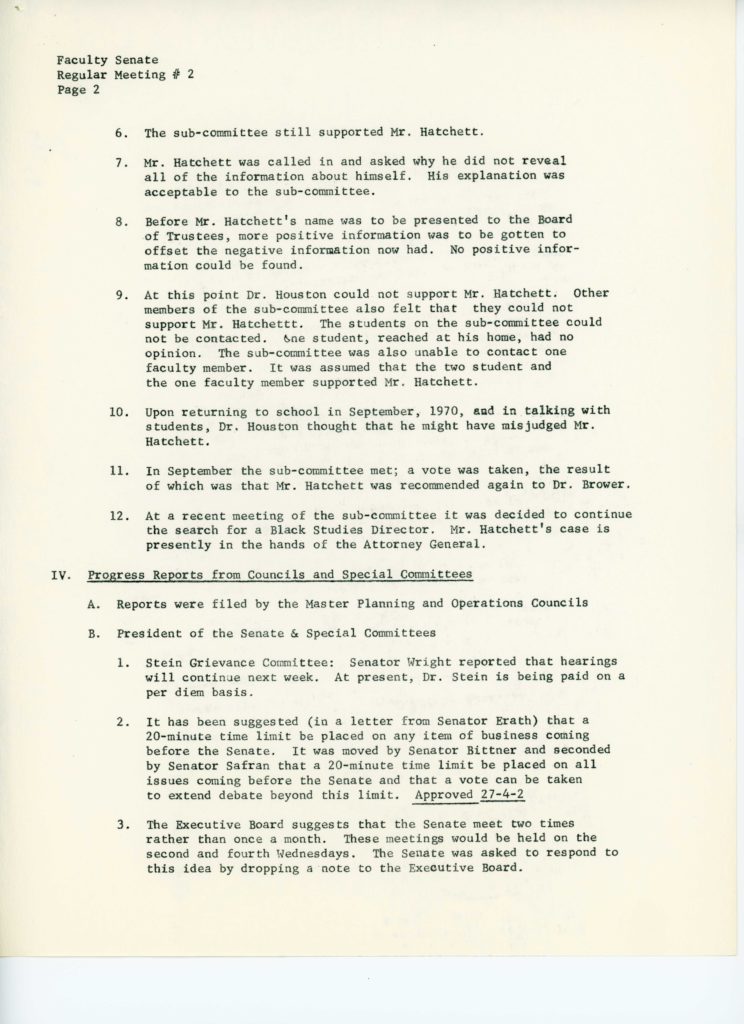
The establishment of the African American Studies Department is a turbulent story, with many outside elements. Starting with the Black power movement, students felt empowered and performed their own protest on campus. These protests, along with the eventual demands sent, pressured Trenton State into developing a program and minor. Though controversy rose as the college locked for a director for the newly founded department as the dismal of John Hatchett seemed to be unjustified and a case of institutional racism. While this was going on, the minor program was being developed with the help of Dr. Williams, who formed many courses to establish the African American Studies as a legitimate educational department. While the story seems to be clearer, there are many hidden elements that have yet to be seen.